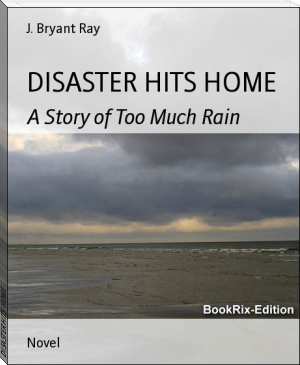DISASTER HITS HOME, J. Bryant Ray [read this if txt] 📗

- Author: J. Bryant Ray
Book online «DISASTER HITS HOME, J. Bryant Ray [read this if txt] 📗». Author J. Bryant Ray
DISASTER HITS HOME
A story of too much rain!
By now I suspect that many have seen or heard some of the stories coming out of the Atlanta area. This is being referred to as the ‘Great Flood’ of 2009.
What follows is my account of our personal experience and is by no means as serious as many of the stories that will follow in the coming weeks. Loss of life and property has been in the 100’s of millions of dollars.
By: J. Bryant Ray
© The Internet Group 2009
The Beginning
The rain and thunderstorms began on Saturday September 18, 2009; not a wholly unexpected event for this time of the year in Georgia. Afternoon heating along with a moderate flow of moisture up from the Gulf of Mexico contributes to sometimes daily thunderstorm activity. There was no indication presented by the weather forecasters that this would be any different from many storms of past years.
Since this same storm had brought significant flooding to areas west of us, especially in Texas and along the Gulf coast I was a bit skeptical. The local forecasters were not predicting a strong weather pattern; some of the computer models even took the storm in a more northern direction perhaps missing the Atlanta area all together.
The record drought of the past few years had led to watering restrictions and extremely low reservoir levels; therefore any predicted rainfall would be a welcomed sight, or so we thought. There had been the typical odd/even address system in place for outdoor watering, with many of the 17 county metro areas under a total outdoor watering ban. Ongoing discussions were being held with the Governors of Georgia, Alabama and Florida, over who had rights to what water, which amphibious creature downstream should be protected, etc, etc…All of this foolishness during a time when water was being regularly let out of our ever decreasing lake levels, to maintain water flow downstream so these precious little crustaceans would be assured of their continued existence.
The rain began early on Friday evening, with a typical off/on pattern of mostly scattered showers. The local news reported a weather watch advisory
as a low pressure area was approaching from the northeast expected to collide with the larger weather system from the west. “A recipe for heavy rainfall”,
I thought.
As Saturday approached the rainfall became much more regular, and by Sunday we were experiencing steady, heavy rainfall with intense lightning and booming thunder! Wave after wave of storms passing thru the county, with no respite between, the local weather forecasters were not able to count all the cloud to ground lightning strikes. I was modestly concerned, as our home sits on 2 1/2 acres bordered to the south by Sweetwater Creek, a tributary of the Chattahoochee River, Atlanta’s major waterway. The “Hooch” eventually makes its way south along the border of Georgia and Alabama, merging with the Flint River and flowing south into Lake Seminole, eventually reaching the western Gulf of Mexico.
By late Sunday evening I began to see resident’s cars slowing to a stop as they attempted to leave the neighborhood; most of them backing up and turning around in our driveway. As there is only one entrance and exit in our development, I decided to investigate the situation.
In our development, a group of some 90 homes, there is a system of three lakes each one flowing into the other until they reach Lake Loraine; from there the water flows into Sweetwater Creek. Lake Loraine was created by constructing an earthen dam approximately 3/4 mile in length and is the roadbed for the main street into and out of the development. My home is located directly across the street from Lake Loraine.
Upon my inspection I noticed that quite a stream of water was flowing over the dam and across the street to reach the creek. It was this flowing water, along with the nighttime darkness, that had deterred neighbors from attempting to cross the roadway. In years past, on several occasions, I had observed the overflowing of the creek but at no time had the water level ever approached what now appeared to be flood stage; I went to bed at my normal time, setting the alarm for 6:00 AM the following morning. By this time it had been raining steadily, sometimes very heavily, for the better part of 24 hours.
I was awakened at 3:10 AM the following morning by a rapid ringing of our front door bell! “Bing-Bing, Bing-Bing, then BING-BING-Bing-bing… It was my next door neighbor. With the aid of my flashlight and in my still partially sleepy condition, I saw what was to become my worst fear! The lake had overflowed its banks and water was rising alongside the western facing wall of my home. We rushed downstairs; at the bottom of the stairs we stepped off into approximately three-feet of flowing water! My basement was now part of Sweetwater Creek. It was at that time that I realized the seriousness of the situation. Outside the rain continued to fall, inside we quickly turned off all electrical power to the downstairs levels along with the natural gas supply to furnaces and water heaters.
We now had nothing to do except wait for sunrise, to more adequately survey the situation. The time was 4:15 AM, I turned on the coffeemaker. By 6:00 AM we had lost electrical power. Still we were about 1 1/2 hours before first light. We sat in the darkened den of our home sipping coffee and trying not to panic.
It was about 6:45 when we heard a very loud noise outside; looking out into the still darkened night I saw a powered vessel of some description adorned with several high-intensity lights rapidly approaching. My first thought, was some type of amphibious craft. It turned out to be an airboat, a very large airboat that had been pressed into service by the local County Emergency Management Team. Their plan was to evacuate anyone wishing to leave the neighborhood for higher ground. After seeing the amount of water present in my basement, I immediately had concern for others along our side of the street, as most of them were located at lower elevations and on much smaller sized lots. For the next several hours we watched as the boat made trip upon trip ferrying homeowners and emergency crews to and from the neighborhood. I would hear the massive engine come up to speed and the boat would drift away, after 2-3 minutes I could no longer hear the engine. Fifteen minutes would pass and yet again I would hear the noise of the boat returning; I am quite sure this Good Samaritan was a most welcomed sight for some of my neighbors!
For the better part of the day on Monday, all we could do was watch, hope and pray that soon the rains would end. My family watched from the screened porch at the rear of the house as the creek continued to rise at an alarming rate. Eventually we begin to see some relief, as the rain slowly tapered off. I continued to hear the airboat enter and exit the neighborhood for the next several hours.
By mid-afternoon on Monday I ventured down to the dam and spillway where I met a cadre of personnel from the county and a structural engineer from the state. He was concerned about a breech of our spillway, which would take out the only exit from the development. I asked him what caused his concern, and his reply was a weakening of the entire structure of the dam from the pressure of the water. The swollen waters of Sweetwater Creek had already taken out the bridge leaving us with only one way out of the development. In addition the dam on the upper lake was perilously close to failure, in which case the concern for Lake Loraine remaining intact was multiplying by the minute. Total evacuation now seemed eminent. I was not aware at the time that another lake yet further up the highway and to the west of us was about to give way.
The proliferation of these “home made” dams and small ponds had been rampant during the mostly unchecked development of the mid-1990’s. Our county was among the fastest growing in the nation during these times. We had abundant land available, close proximity to Atlanta and a short ride to the airport. In brief our county was prime real estate just waiting for development. Anytime you could advertise land at $20,000/acre, then add a water feature, the land value would easily double leaving the developer a handy profit for a modest investment. Unfortunately this was all too often the case; poor construction techniques and a lack of proper physical inspection would lead to disaster.
The local EMC worked around the clock attempting to restore power to hundreds of thousands of homeowners in the affected area. Our power was restored by late Wednesday, much too late to salvage anything from our two abundantly stocked refrigerators and freezers. The following day we began the task of evaluation and clean up. For three days we labored alongside a crew of debris hauling trucks to finally rid the lower floor of our home of what just days before had been a finished basement with a large communications room, workshop and gym complete with a dry sauna and Jacuzzi.
The next day we began to fight our way into the outside storage building with its myriad of power tools, lawn and garden equipment, chain saws and one John Deere tractor. My family followed for the next two days in salvaging what they could of the cartons that had not been totally submersed in water while I began the task of drying out all of what I thought was salvageable in the way of power equipment.
My next door neighbor had a similar amount of interior damage; however, he also has a 25 X 35 in-ground pool which was covered by in excess of five feet of water. We worked side by side occasionally greeting each other with shrugs of “Oh well, It’s Only STUFF!”
One week has now passed and we are slowly getting back to a starting point, I say starting point because we have been working around the clock with dehumidifiers, fans and brooms to get all the moisture out of areas where mold will quickly grow. Reconstruction and restoration will take months to complete.
Valuable lessons learned are: (1) Fight for your ability to obtain insurance coverage for disasters not covered by standard





Comments (0)